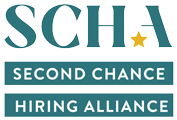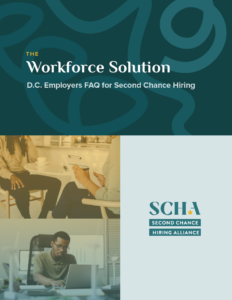SCHA Employers
SCHA helps your organization navigate the process of hiring justice-impacted individuals. See below for resources to support your work.

For employers all across the spectrum, being able to recruit and retain hard working, qualified, and enthusiastic employees is critical. Participating in second chance hiring, and removing traditional barriers to employment for justice-impacted individuals, creates the opportunity for economic security and mobility for justice-impacted residents, but also to build safer and more prosperous communities – a win for all.
We have compiled resources below to assist you in implementing second chance hiring practices in three different categories:
- Toolkits and Guides
- Legal Info and Data
- Benefits of Second Chance Hiring
Featured Resource: “The Workforce Solution: D.C. Employer’s FAQ for Second Chance Hiring”
Are you a D.C. employer who is struggling to fill open positions? Do you own a business you are trying to scale up but you need to hire talent? You need The Workforce Solution!
This valuable resource from the Second Chance Hiring Alliance will answer your questions about the legal requirements, financial incentives, and protections available to you as an employer looking to expand your applicant pool through second chance hiring. Second chance hiring is the practice of hiring people with criminal records, including those who have experienced incarceration, otherwise known as “justice-impacted.”
Justice-impacted people in DC are a crucial untapped workforce solution for your business. Download The Workforce Solution now and contact us to get started today!
Toolkits and Guides
Four Tips for Second Chance Hiring
Learn four best practices for implementing second chance hiring in your business.
National Resources on Second Chance Hiring
Explore extensive resources from the national Second Chance Business Coalition.
How to Become a Second Chance Employer
A guide, road map and resources for employers to effectively implement second chance hiring practices from the Responsible Business Initiative for Justice.
A Fair Chance Hiring Guide Toolkit
A useful toolkit for employers to adapt second chance hiring practices from the Center for Employment Opportunities.
Legal Info and Data
Second Chance Employment: Addressing Concerns About Negligent Hiring Liability
Produced in collaboration with the National Workrights Institute, this report aims to provide employers a better understanding of the magnitude of the risk of negligent hiring liability and the circumstances in which employers have been found liable when employing a worker with a conviction history.
Second Chance Hiring Resource Guide
The Manufacturing Institute published Second Chance Initiative Resource Guide: The Case for Second Chance Hiring. This guide is designed to give industry the tools needed to explore and implement Second Chance hiring practices.
Collateral Consequences
This resource from the National Institute of Justice provides a data-driven look at the effects of “collateral consequences” that attach not only to individuals with felonies on their record and those incarcerated but also to people with misdemeanors and those who have never been incarcerated.
Benefits of Second Chance Hiring
3 Myths About Hiring People with Criminal Records
This article from Harvard Business Review addresses 3 common myths about hiring people with criminal records and highlights how second chance hiring can benefit the employer, employee, and the U.S. economy.
Benefits of Hiring Justice-Impacted Candidates
A resource from Prism Reform on the advantages, benefits, and incentives to businesses of hiring justice-impacted-job seekers.
More Employers Taking a Closer Look at Candidates with Criminal Histories
The Society for Human Resource Management highlights the benefits of second-chance hiring, emphasizing that employing formerly incarcerated individuals enhances diversity, equity, inclusion, and retention. It also advocates for a personalized, skills-based hiring approach to optimize employee-employer fit.

